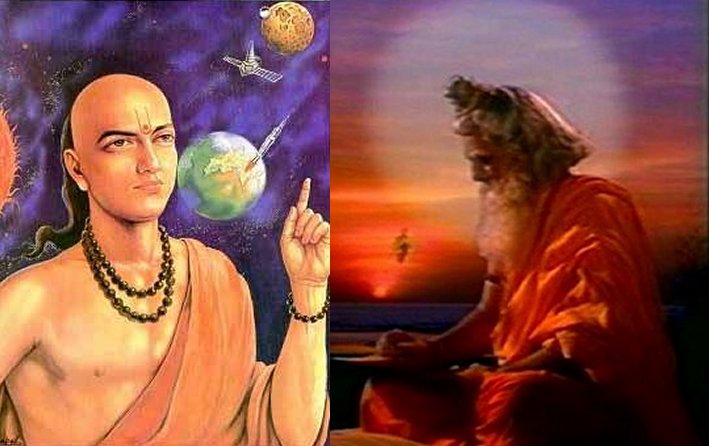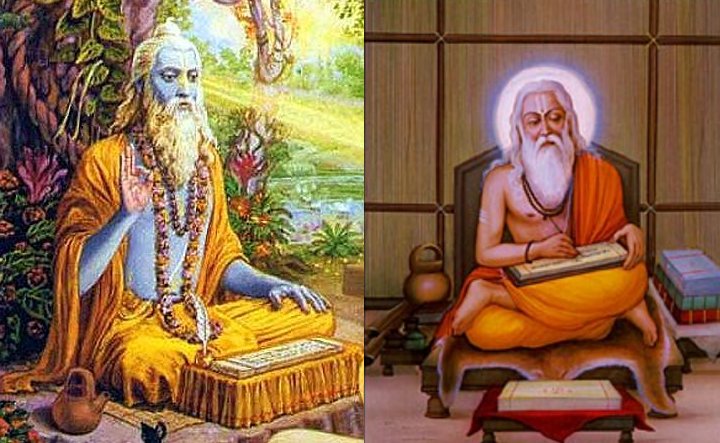Ancient Indian Sages Had Highly Advanced Scientific Knowledge Thousands Of Years Ago
Ellen Lloyd - AncientPages.com - Is it possible that some of the world's greatest scientific achievements originate from India? Could it be that many of our modern inventions are not so 'modern' at all?
Can ancient Hindu texts offer evidence that ancient Indian scientists were familiar with today's technology thousands of years ago?
Were ancient Indian scientists familiar with high-tech long before other civilizations gained the same knowledge? Credit: Public Domain
To suggest that India possessed superior scientific knowledge long before the rest of the world may seem like a very controversial statement, but if we take a look at ancient texts, myths, and legends, this claim does not seem far-fetched at all. Ancient India was adept at genetics and plastic surgery, and it is believed that the miraculous birth of the warrior king Karna in the Mahabharata, the Hindu epic, outside his mother's womb offers evidence that "genetic science was present at that time".
This subject was discussed in our article dealing with the suggestion that evidence of plastic surgery and genetic science has been found in ancient Vedas.
Is it possible that skilled doctors conducted complicated surgeries like fractures, cesareans, removing of urinary stones, cataract surgery, artificial limbs, brain surgery, and even plastic surgery thousands of years ago in India?
Evidence Of Ancient High-Tech In Vedic Scriptures
By studying the ancient Sanskrit texts with great attention to detail, we can rediscover prehistoric aviation activities of the Indian gods.
Indian legends refer to horseless chariots and to airplane-like vehicles. India was the land of flying machines, known as Vimanas described in many ancient texts like Yajurveda, Mahabharata, Samarangana Sutradhara, Rigveda, Ramayana, and even older ones.
In the Mahabharata, the hero Arjuna, for example, sees "an incredible ship of the sky" which lands softly on the ground. "Wonderful lights flashed on the Vimana's smooth body.
Arjuna rose and approached the craft, a door opened at its side and a flight of steps flowed out from it."
Rishi Vyas, a sage who classified the Vedas and is also generally considered the author of the Mahabharata. Image credit. srimadbhagavatam.org
These machines existed thousands of years ago in ancient India. We also know from Vedic scripts that the gods' weapon arsenal included nuclear, biological, chemical, and meteorological weapons. In ancient texts, it is mentioned how ancient Indian gods were in possession of a weapon called the "Pasupata". It was forbidden to launch it against humans and planet Earth.
The weapon remains a big mystery. The only thing we know is that it was used only once when Arjuna wanted to demonstrate the weapon's potential to his brother. After launching the Pasupata, the whole Earth began trembling, the mountains were divided, and an extremely strong wind began to blow, followed by a great fire and the darkened sun. The other gods then yelled: "Arjuna, Arjuna does not use this weapon." Another weapon that was forbidden to use on the Earth was a special arrow called the "Pradyumna", which if launched had similar destructive effects on the planet.
The Legend Of Kauravas is a very curious story that raises many thought-provoking questions. The story described in Mahabharata tells about Kauravas who were 100 sons of the King of Hastinapur Dhritarashtra, and his wife Gandhari. How could Gandairi give birth to 100 children on the same day? Why were all 100 babies taken out of their jars all at once? Were people in ancient India familiar with cloning and test-tube babies? It certainly does sound remarkable, but if true, it wouldn't be the first time we encounter ancient sophisticated knowledge in India that has somehow been “neglected” by modern science.
According to Vedic literature, the mysterious Rishis lived thousands of years ago, before the dawn of historical times, in a remote region of the Himalayas. The Rishis were extraordinary in many ways. They were spiritual scientists who possessed divine knowledge and mastered astronomy, technology, medicine, and many other scientific fields.
The Rishis were extraordinary scientists. Credit: Pinterest/image complied by Ancient Pages
The four Rishis Agni, Vayu, Aditya, and Angiras were later replaced with another group of Rishis, who were seers, with an amazing memory, and they passed on this knowledge to successive generations. In India, these great beings seem to have taken birth again and again in every age to keep up the Sanatana Dharma, which they cognized at the beginning of the world!
Giving mythological lessons to defense scientists, India’s defense minister Manohar Parrikar said the ancient sages of the country were “probably great scientists”.
Parrikar also said that the "vajra", a mythical indestructible weapon was most likely superior technology used by a highly advanced ancient civilization in India.
Vajra is a Sanskrit word that defies translation because of its numerous meanings, but essentially vajra is an indestructible substance, usually represented by a diamond. Read more
What was most unusual about the Rishis was their ability to combine spirituality with science. The Rishis had control over ego and anger. They were very educated and yet they remained humble.
If you are curious about ancient Indian scientists, you can read here about ten remarkable ancient Indian sages who knew were familiar with gravity, airplanes, missiles, atomic theory, medicine, astronomy, cosmology, and long before the modern era.
Written by Ellen Lloyd – AncientPages.com
Copyright © AncientPages.com All rights reserved. This material may not be published, broadcast, rewritten or redistributed in whole or part without the express written permission of AncientPages.com
More From Ancient Pages
-
 Arizona’s Enigmatic Beehive-Shaped Stone Coke Ovens
Featured Stories | Jul 15, 2023
Arizona’s Enigmatic Beehive-Shaped Stone Coke Ovens
Featured Stories | Jul 15, 2023 -
 Mystery Of The Faceless Creature – Ancient And Modern Sightings
Ancient Mysteries | Jun 19, 2018
Mystery Of The Faceless Creature – Ancient And Modern Sightings
Ancient Mysteries | Jun 19, 2018 -
 Leprechaun: One Of The Most Famous And Powerful Creatures Of The Irish Faerie Folk
Celtic Mythology | May 8, 2016
Leprechaun: One Of The Most Famous And Powerful Creatures Of The Irish Faerie Folk
Celtic Mythology | May 8, 2016 -
 Australia’s Submerged Indigenous Sites – New Discoveries And Study
Archaeology | Aug 31, 2021
Australia’s Submerged Indigenous Sites – New Discoveries And Study
Archaeology | Aug 31, 2021 -
 Sacred Crystals Of The Cherokee – Myths, Traditions And History Explained
Featured Stories | Jun 3, 2019
Sacred Crystals Of The Cherokee – Myths, Traditions And History Explained
Featured Stories | Jun 3, 2019 -
 Manuscripts And Art Support Evidence That Syphilis Was In Europe Long Before Explorers Could Have Brought It Home
Featured Stories | Jul 15, 2022
Manuscripts And Art Support Evidence That Syphilis Was In Europe Long Before Explorers Could Have Brought It Home
Featured Stories | Jul 15, 2022 -
 Mysterious Ancient European Cloaked Individuals – Who Were These Perplexing Beings?
Featured Stories | Mar 15, 2025
Mysterious Ancient European Cloaked Individuals – Who Were These Perplexing Beings?
Featured Stories | Mar 15, 2025 -
 Facial Reconstruction Of A 75,000-Year-Old Neanderthal Woman From Shanidar Cave
Archaeology | May 3, 2024
Facial Reconstruction Of A 75,000-Year-Old Neanderthal Woman From Shanidar Cave
Archaeology | May 3, 2024 -
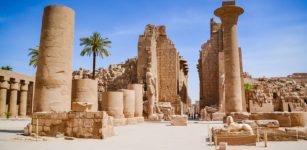 Gigantic Karnak Temple Complex: Advanced Ancient Technology In Egypt
Civilizations | Apr 6, 2017
Gigantic Karnak Temple Complex: Advanced Ancient Technology In Egypt
Civilizations | Apr 6, 2017 -
 Ancient Mystery Of Pharaohs And Gods With Two Left Or Two Right Hands – A Deeper Investigation
Featured Stories | Jan 30, 2025
Ancient Mystery Of Pharaohs And Gods With Two Left Or Two Right Hands – A Deeper Investigation
Featured Stories | Jan 30, 2025 -
 Prehistoric Swiss Army Knife Shows How Early humans Communicated
Archaeology | Jun 9, 2022
Prehistoric Swiss Army Knife Shows How Early humans Communicated
Archaeology | Jun 9, 2022 -
 Cahuachi – Complex Of Truncated Adobe Pyramids In Peru’s Desert
Civilizations | Aug 27, 2015
Cahuachi – Complex Of Truncated Adobe Pyramids In Peru’s Desert
Civilizations | Aug 27, 2015 -
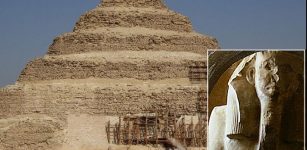 New Theory On “Dry Moat” At The Pyramid Of Pharaoh Djoser
Archaeology | Jul 3, 2019
New Theory On “Dry Moat” At The Pyramid Of Pharaoh Djoser
Archaeology | Jul 3, 2019 -
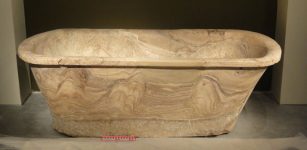 Where Were Herod The Great’s Royal Alabaster Bathtubs Quarried?
Archaeology | May 17, 2022
Where Were Herod The Great’s Royal Alabaster Bathtubs Quarried?
Archaeology | May 17, 2022 -
 Hispano-Visigothic Grave At Ojo Guareña – Resting Place Of A Hermit Who Sought Isolation When The Moors Arrived?
Archaeology | Sep 17, 2021
Hispano-Visigothic Grave At Ojo Guareña – Resting Place Of A Hermit Who Sought Isolation When The Moors Arrived?
Archaeology | Sep 17, 2021 -
 Europe’s Oldest Time Capsule Discovered Inside A Statue Of Jesus In Spain?
Archaeology | Dec 1, 2017
Europe’s Oldest Time Capsule Discovered Inside A Statue Of Jesus In Spain?
Archaeology | Dec 1, 2017 -
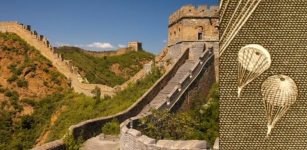 Parachute May Have Been Invented By Ancient Chinese – Not Leonardo Da Vinci
Featured Stories | Dec 14, 2018
Parachute May Have Been Invented By Ancient Chinese – Not Leonardo Da Vinci
Featured Stories | Dec 14, 2018 -
 King Solomon’s Magical Shamir Could Cut Through Any Stone – Proof Of Advanced Ancient Technology?
Featured Stories | Aug 23, 2018
King Solomon’s Magical Shamir Could Cut Through Any Stone – Proof Of Advanced Ancient Technology?
Featured Stories | Aug 23, 2018 -
 Echidna – Mother Of All Monsters – A Cave-Dwelling Female Hybrid Creature In Greek Mythology
Featured Stories | Jan 13, 2022
Echidna – Mother Of All Monsters – A Cave-Dwelling Female Hybrid Creature In Greek Mythology
Featured Stories | Jan 13, 2022 -
 Obsidian Flake From 45,000-Year-Old Tool Unearthed In Armenia
Archaeology | Jul 18, 2022
Obsidian Flake From 45,000-Year-Old Tool Unearthed In Armenia
Archaeology | Jul 18, 2022

